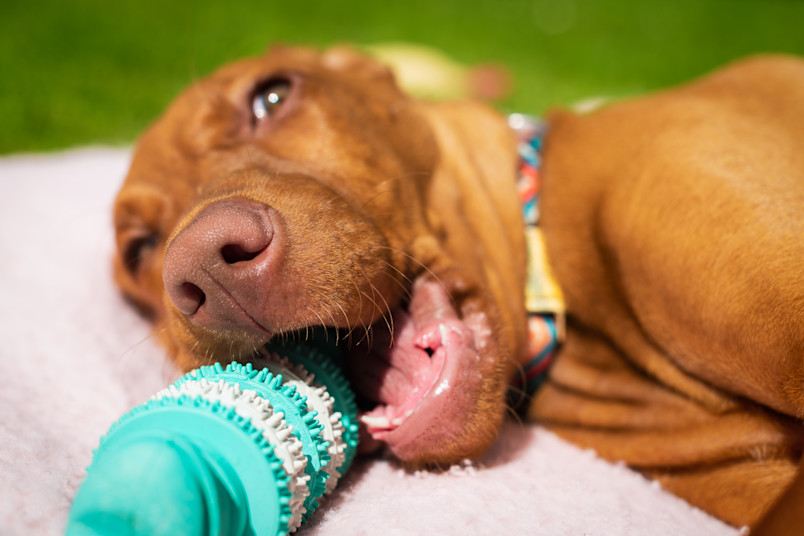
The moment you cradle your new puppy in your arms, a sense of pure joy washes over you. Those soft whimpers, the tiny paw nestled in your hand – it's a love that instantly blossoms. Bringing home a new puppy is a whirlwind of excitement. From the first playful nips to those endless, cuddly moments, it's a time filled with unforgettable memories. However, this initial puppy stage also comes with its own set of challenges, and understanding your pup's development is key to a smooth transition.
At puppy visits at our veterinary office, I make sure to go over everything I can think of that a new owner can expect over the first year of their new pup’s life. I find most owners are familiar with the need to potty train and stay up to date on vaccine boosters, but some are unaware that puppies will lose their first set of teeth.
When I let them know that just as in human babies, our pups will lose their first set of teeth and they may find puppy teeth around the house, some find this cute, while others find it surprising or disturbing. While teething is a natural part of puppyhood, it can also be a time of discomfort. Luckily, there are things you can do to support your pup through this phase and keep them happy and healthy (and your favorite shoes safe!).
When Do Puppies Start Losing their Teeth?
When puppies are born there are no visible teeth for up to 2 weeks, around which time their eyes begin to open and their first set of teeth, also known as deciduous teeth, erupt from the gums. Although cute, these teeth are extremely sharp. All puppy teeth should be erupted by 4 weeks of age, and this is around the time a breeder and also the dam, will likely start to wean the pups a bit. This involves beginning to introduce wet food and milk-soaked food to the pups.
Between 12-16 weeks of age to about 6 months of age, puppies will lose all 28 of their deciduous teeth starting with the incisors and ending with the canines. These are replaced by their 42 permanent adult teeth. Sometimes puppy teeth do not fall out on their own. It is recommended that any retained puppy teeth be pulled to prevent excessive buildup of dental tartar that tends to occur around these teeth. I often recommend having this done when the pet is spayed or neutered.
How to Help a Teething Puppy
Just as in human babies, the process of new teeth erupting can be extremely uncomfortable. This is when owners tend to notice an increase in chewing behavior and sometimes even drooling or mild bloody discharge from the gums. Some pups will whine when they eat or chew their food. It is our job as owners to provide appropriate outlets for their need to chew. So, how do you help a teething puppy?
There are lots of options available to offer relief to a teething puppy. I often recommend keeping toys on hand such as a Kong or Chilly Bone which can be frozen to numb sore gums. Toys come in all sizes so making sure you pick the right one for your dog’s size to avoid a choking hazard is important. Frozen foods such as strawberries or pieces of banana can turn a nutritious snack into a soothing treat. If your puppy is chewing on something they should not be, remove that object and offer them an appropriate alternative. “Puppy proofing”, a.k.a. keeping valuables such as shoes and purses picked up off the ground, is another way to avoid an unwanted chewing incident.

Training your Puppy to Teethe Appropriately
Puppies are like sponges at the age of 3-6 months. They are soaking in their environment as well as their interactions with their owners. They are making connections and beginning to understand commands and right from wrong. Although it may seem cute when a puppy grabs a sock or shoe, now is the time to deter it and teach them what they can and cannot play with. Redirect them if they are choosing your toes or fingers as a chew toy. Now is also the time to get them used to things such as physical exams, nail trimming and teeth brushing. It is a lot harder to get a dog to adapt to these procedures if first introduced at an older age.
Preparing for the Unexpected
Laying a foundation for your pup's lifelong health starts early. Just like introducing appropriate chew toys and establishing positive training habits, securing puppy insurance is a valuable step. This puts a financial safety net in place for pet parents prior to the onset of any pre-existing conditions that may otherwise not be covered by insurance. In the event your pup has dental issues or a puppy tooth that will just not fall out, Embrace is there to help cover the unexpected costs, offering up to 90% reimbursement for illness and injury visits. Embrace also offers an optional wellness package to break up more routine care like vaccinations costs or dog teeth cleaning costs.
When Do Puppies Stop Teething?
Puppyhood may be short-lived, but the memories made during this cuddly, chaotic time last a lifetime. While navigating the teething stage requires patience and understanding, the rewards are immeasurable. By providing your pup with safe chew toys, gentle dental care, and a whole lot of love, you can help them navigate this uncomfortable phase and establish a foundation for lifelong oral health.
Remember, those tiny chompers eventually transform into healthy, happy smiles. More importantly, the bond you forge during these early days strengthens with every playtime, every comforting cuddle, and every obstacle you overcome together. These shared experiences become the building blocks of a lifelong friendship, a connection that brings endless joy and unconditional love.